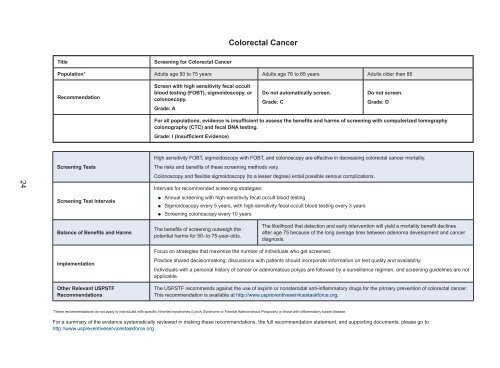1DpwC8F
1DpwC8F
1DpwC8F
Create successful ePaper yourself
Turn your PDF publications into a flip-book with our unique Google optimized e-Paper software.
Colorectal Cancer<br />
Title<br />
Screening for Colorectal Cancer<br />
Population 1 Adults age 50 to 75 years Adults age 76 to 85 years Adults older than 85<br />
Recommendation<br />
Screen with high sensitivity fecal occult<br />
blood testing (FOBT), sigmoidoscopy, or<br />
colonoscopy.<br />
Grade: A<br />
Do not automatically screen.<br />
Grade: C<br />
Do not screen.<br />
Grade: D<br />
For all populations, evidence is insufficient to assess the benefits and harms of screening with computerized tomography<br />
colonography (CTC) and fecal DNA testing.<br />
Grade: I (Insufficient Evidence)<br />
24<br />
Screening Tests<br />
Screening Test Intervals<br />
High sensitivity FOBT, sigmoidoscopy with FOBT, and colonoscopy are effective in decreasing colorectal cancer mortality.<br />
The risks and benefits of these screening methods vary.<br />
Colonoscopy and flexible sigmoidoscopy (to a lesser degree) entail possible serious complications.<br />
Intervals for recommended screening strategies:<br />
●●<br />
●●<br />
●●<br />
Annual screening with high-sensitivity fecal occult blood testing<br />
Sigmoidoscopy every 5 years, with high-sensitivity fecal occult blood testing every 3 years<br />
Screening colonoscopy every 10 years<br />
Balance of Benefits and Harms<br />
The benefits of screening outweigh the<br />
potential harms for 50- to 75-year-olds.<br />
The likelihood that detection and early intervention will yield a mortality benefit declines<br />
after age 75 because of the long average time between adenoma development and cancer<br />
diagnosis.<br />
Implementation<br />
Other Relevant USPSTF<br />
Recommendations<br />
Focus on strategies that maximize the number of individuals who get screened.<br />
Practice shared decisionmaking; discussions with patients should incorporate information on test quality and availability.<br />
Individuals with a personal history of cancer or adenomatous polyps are followed by a surveillance regimen, and screening guidelines are not<br />
applicable.<br />
The USPSTF recommends against the use of aspirin or nonsteroidal anti-inflammatory drugs for the primary prevention of colorectal cancer.<br />
This recommendation is available at http://www.uspreventiveservicestaskforce.org.<br />
1<br />
These recommendations do not apply to individuals with specific inherited syndromes (Lynch Syndrome or Familial Adenomatous Polyposis) or those with inflammatory bowel disease.<br />
For a summary of the evidence systematically reviewed in making these recommendations, the full recommendation statement, and supporting documents, please go to<br />
http://www.uspreventiveservicestaskforce.org.


